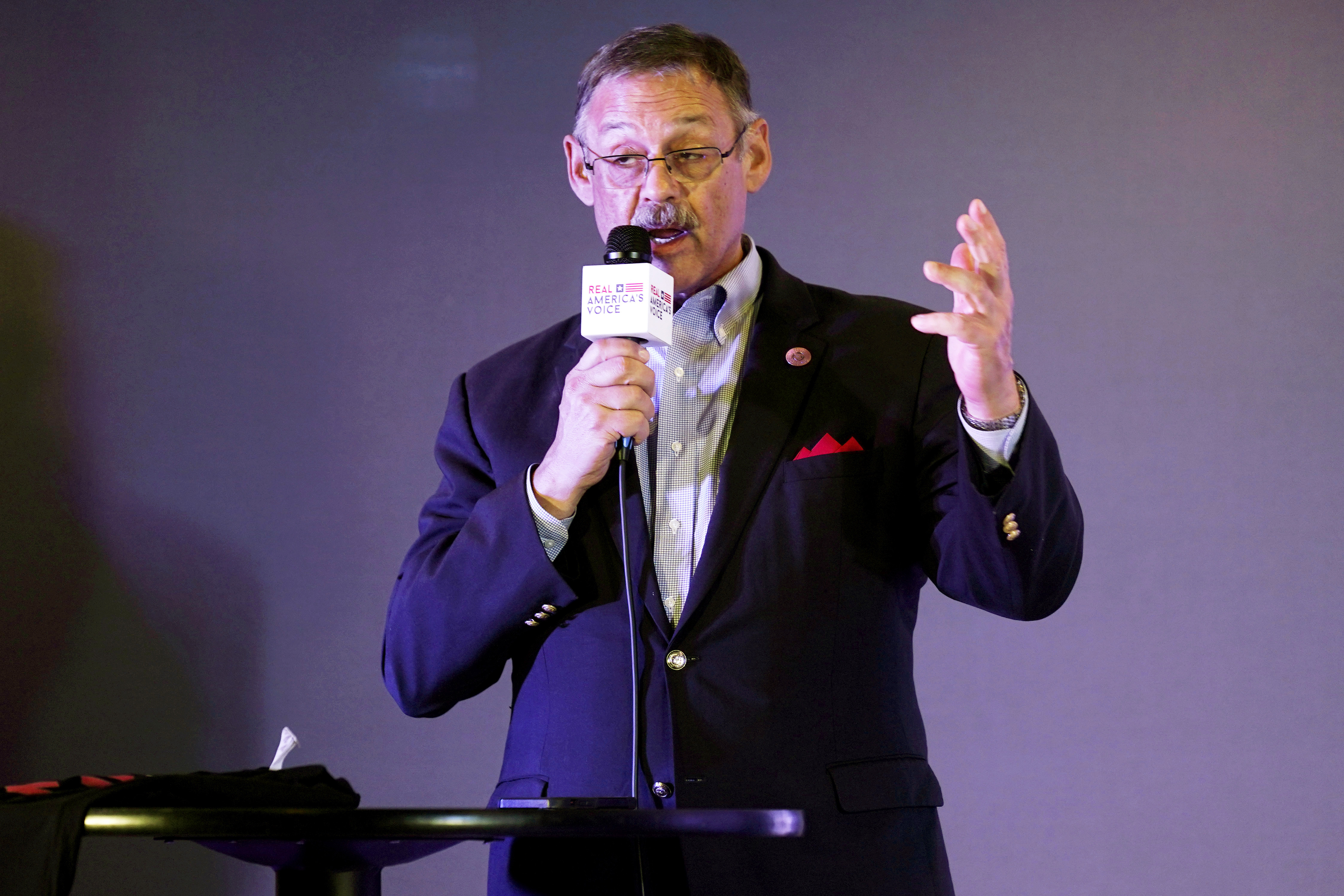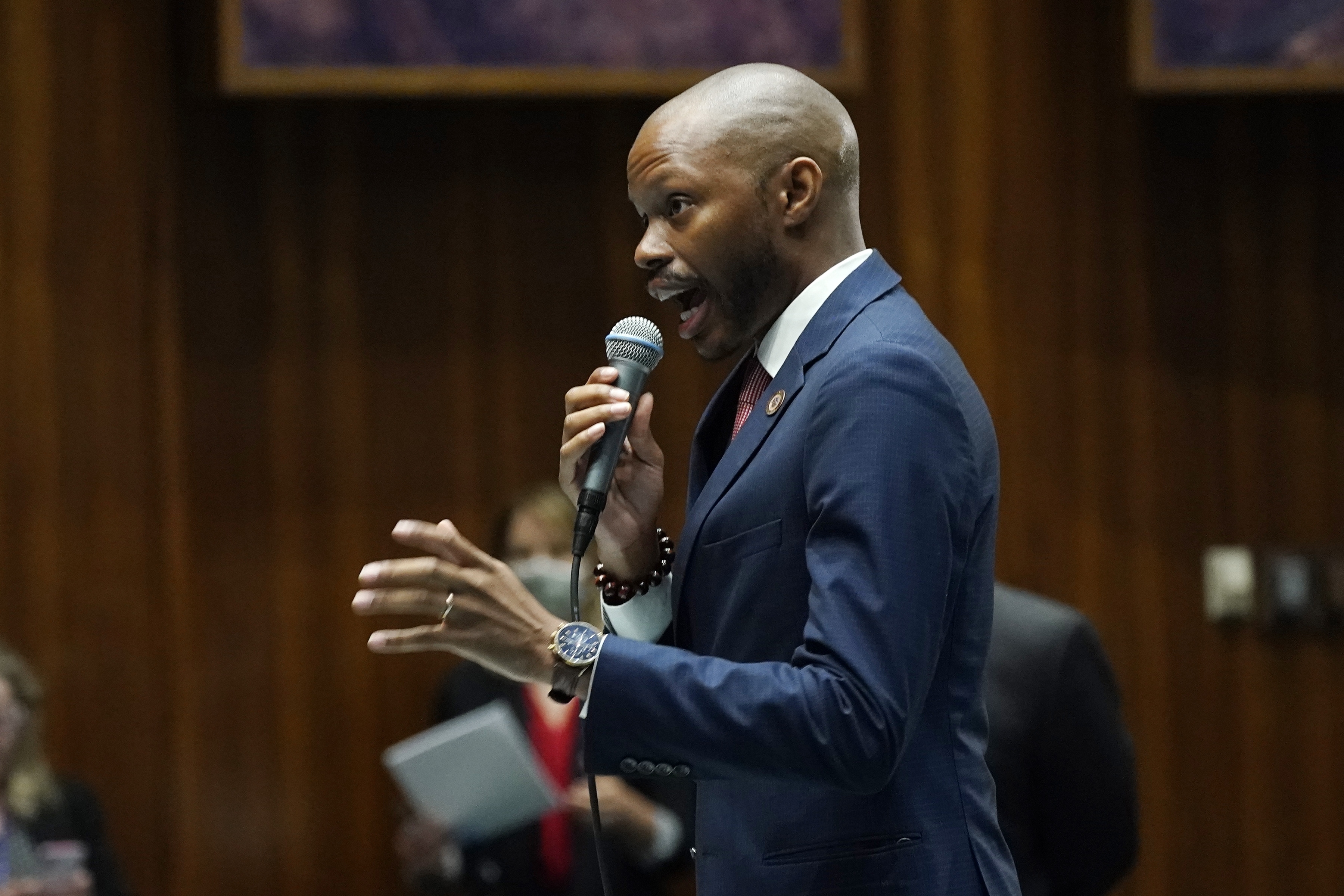Trump-backed conspiracy theorist makes charge for chief election position in Arizona

Mark Finchem — a poster child for election deniers following the 2020 election — is inching closer to becoming the chief election official in one of the most tightly divided battleground states in the country.
Finchem, an Arizona state lawmaker, is running with former President Donald Trump’s endorsement in Tuesday’s Republican primary for secretary of state there. He has support from a coalition of other like-minded candidates running to be election administrators in their own states, which has gained traction in several other close 2020 swing states. And Finchem has a significant edge in a rare public poll of the secretary of state race published Friday.
Should he win on Tuesday, Finchem will become the latest member of the “America First Secretary of State Coalition” to secure the Republican nomination in a key battleground, putting them a general election win away from running the 2024 presidential vote in their states — four years after working to subvert President Joe Biden’s election win and falsely claiming the vote was marred. The coalition’s founder, Jim Marchant, is the Republican nominee in Nevada, while Kristina Karamo is the de-facto GOP pick in Michigan. And in Pennsylvania, where the governor picks the state’s chief election official, coalition member Doug Mastriano is the GOP candidate.
In Arizona, where GOP state legislators have embraced Trump’s fictions and financed investigations into the 2020 vote count, Trump supporters are “gunning for secretary of state,” said Mike Noble, the chief of research and managing partner at the Arizona-based polling firm OH Predictive Insights. “[It] is definitely one they have really put a priority on.”
Finchem does face significant opposition in the primary, including from Beau Lane, a businessman endorsed by GOP Gov. Doug Ducey. But if the latest polling is any guide, Arizona Republicans are poised to elevate someone who has relentlessly sought to undermine confidence in state elections as their pick to run future elections.
Finchem has been one of the chief proponents of election conspiracy theories since the 2020 election. He was a significant booster of the GOP-led review of all of the ballots cast in 2020 in Maricopa County, Arizona’s largest county, which was strongly opposed by the Republican-dominated county government and a bipartisan cast of election officials. Finchem also advocates the fanciful plan of “decertifying” the 2020 election results in Arizona, which has no basis in the law, and he counts others who worked to undermine American elections among his prominent supporters, including Michael Flynn, Jenna Ellis and Mike Lindell.
Finchem has charged ahead in the lone series of public polling from OH Predictive Insights. The group’s surveys over the last year have had Finchem in the lead but never getting above the mid-teens.
But in their final poll on the eve of the primary, Finchem stormed ahead, leading the field with 32 percent, compared to 11 percent for his closest rival in Lane. The Trump-backed candidates in the Republican primaries for governor and Senate, Kari Lake and Blake Masters, respectively, also had double-digit leads in the survey.
“Trump’s recent visit to Arizona really helped increase the awareness” of his endorsed candidates, Noble said, but particularly of the secretary of state’s race.
Finchem’s biggest challenger for the nomination is believed to be Lane, an advertising executive. Two state lawmakers — Michelle Ugenti-Rita and Shawnna Bolick — were in the high single digits in the OHPI poll, with a plurality of 41 percent still undecided.
Lane hails from the business wing of the state party. He launched his campaign touting the endorsement of dozens of business leaders in the state. And in July, he scored the endorsement of outgoing Ducey, the term-limited governor, who praised him for his integrity and “competence in [his] ability to actually do the job they seek.”
“I think the governor recognizes the importance of having someone who could actually be governor in addition to being secretary of state,” said Daniel Scarpinato, a veteran consultant and former top Ducey aide who is on Lane’s campaign team. “I think he sees Beau as being a mainstream conservative who could effectively execute our elections without politicizing it.”
Finchem has derided Lane as a “Democrat plant” on his Telegram channel, and has claimed that internal polls have shown him up over the advertising exec. But supporters of Finchem have shown at least some concern about the rest of the field potentially splitting the vote.
Trump put out a statement days before the ballot request deadline in the state, reinforcing his endorsement of Finchem as “the kind of fighter we need to turn Arizona and our Country around.” The former president also attacked one of Finchem’s opponents in his statement — but went after Ugenti-Rita as “a weak ‘Never Trumper’ RINO” without mentioning Lane.
Lane and Finchem have been the only two candidates with notable advertising expenditures on the airwaves, according to data from the ad tracking firm AdImpact. Lane’s campaign has spent roughly $423,000 on TV and radio advertising, edging out the roughly $256,000 that Finchem has spent there. (Finchem also has about $79,000 in digital advertising.)
Lane’s most recent spot has been a contrast spot, attacking Finchem for once supporting the National Popular Vote Compact — “if he had it his way, Hillary Clinton would have been our president” — while playing up his background as a “business guy.” Finchem’s ad, meanwhile, features Trump praising him and boosting his role with the election review in the state.
But the combined spending of well under $1 million between the two men is merely a drop in the bucket compared to the tidal wave of political advertising that Arizonans are currently subjected to. Over $93 million has already been spent on radio and television ads in Arizona this year — headlined by the competitive Republican gubernatorial and Senate primaries.
“It is a low-information race, which is kind of unfortunate because it is an important position,” said Scarpinato. “Because you have so many competitive races, more than we’ve really seen in a generation in Arizona, you have a lot of people undecided and that is leaving some of these downballot races wide open.”
It is also the second major primary in the state that pits Ducey against Trump, who have publicly feuded since the 2020 election. In the governor’s race, Ducey has backed former state board of regents member Karrin Taylor Robson, while Trump has thrown his support behind Lake, a former TV anchor.
The Arizona secretary of state race is expected to be among the most competitive election administrator elections this year. And it will be an open race, with current Democratic Secretary of State Katie Hobbs the frontrunner for the Democratic gubernatorial nomination.
The Democratic primary is a faceoff between Adrian Fontes, the former top election official for Maricopa County, and state House Minority Leader Reginald Bolding.
That primary has quietly become acrimonious between the two men. The political arm of a nonprofit founded by Bolding called Our Voice Our Vote has helped boost his campaign, leading to charges of self-dealing from Fontes’ camp. (Bolding told the Arizona Republic that he and his wife have walled themselves off from the political operation of the nonprofit.) And Fontes blamed Bolding’s apparatus for airing an overdue tax bill, which he said was inadvertent.

The race will also test the saliency of the election conspiracy theories that have been so potent in Arizona. Finchem and Lake have worked together in the past: The two filed a joint lawsuit looking to block the use of ballot tabulators in the state, a common target for unfounded claims about the security of American elections.
Barring a blowout in a statewide primary, there’s a strong chance that the winner of the election won’t be known on Tuesday night — the exact situation that Trump took advantage of in 2020 to discredit his loss.
Both Finchem and Lake have signaled they are more than willing to follow the former president’s lead with their own campaigns. In a joint Q&A at a late June fundraiser, which was first reported by Axios Phoenix, both candidates suggested that they would challenge a loss.
“Ain’t gonna be no concession speech coming from this guy,” Finchem said. “I’m going to demand a 100 percent hand count if there’s the slightest hint that there’s an impropriety.”
Go To Source
Author: POLITICO

